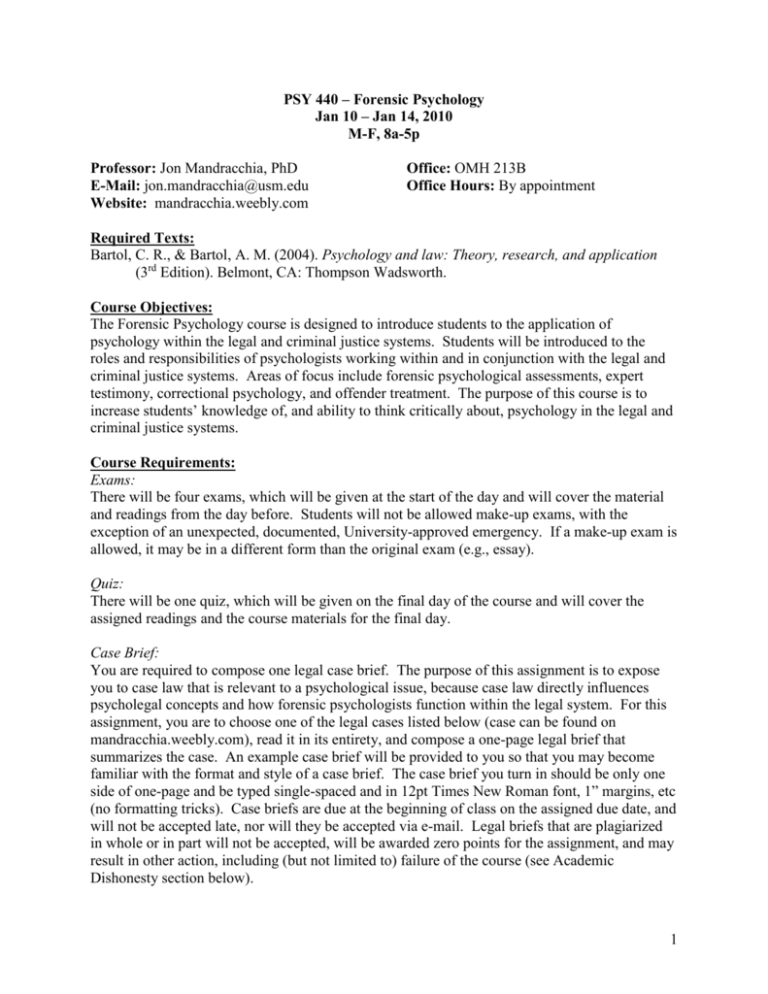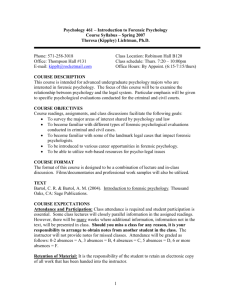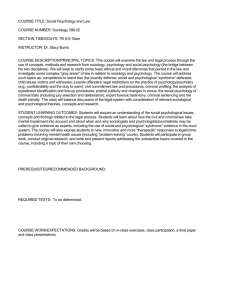Grading Scale - Jon Mandracchia, Ph.D.
advertisement

PSY 440 – Forensic Psychology Jan 10 – Jan 14, 2010 M-F, 8a-5p Professor: Jon Mandracchia, PhD E-Mail: jon.mandracchia@usm.edu Website: mandracchia.weebly.com Office: OMH 213B Office Hours: By appointment Required Texts: Bartol, C. R., & Bartol, A. M. (2004). Psychology and law: Theory, research, and application (3rd Edition). Belmont, CA: Thompson Wadsworth. Course Objectives: The Forensic Psychology course is designed to introduce students to the application of psychology within the legal and criminal justice systems. Students will be introduced to the roles and responsibilities of psychologists working within and in conjunction with the legal and criminal justice systems. Areas of focus include forensic psychological assessments, expert testimony, correctional psychology, and offender treatment. The purpose of this course is to increase students’ knowledge of, and ability to think critically about, psychology in the legal and criminal justice systems. Course Requirements: Exams: There will be four exams, which will be given at the start of the day and will cover the material and readings from the day before. Students will not be allowed make-up exams, with the exception of an unexpected, documented, University-approved emergency. If a make-up exam is allowed, it may be in a different form than the original exam (e.g., essay). Quiz: There will be one quiz, which will be given on the final day of the course and will cover the assigned readings and the course materials for the final day. Case Brief: You are required to compose one legal case brief. The purpose of this assignment is to expose you to case law that is relevant to a psychological issue, because case law directly influences psycholegal concepts and how forensic psychologists function within the legal system. For this assignment, you are to choose one of the legal cases listed below (case can be found on mandracchia.weebly.com), read it in its entirety, and compose a one-page legal brief that summarizes the case. An example case brief will be provided to you so that you may become familiar with the format and style of a case brief. The case brief you turn in should be only one side of one-page and be typed single-spaced and in 12pt Times New Roman font, 1” margins, etc (no formatting tricks). Case briefs are due at the beginning of class on the assigned due date, and will not be accepted late, nor will they be accepted via e-mail. Legal briefs that are plagiarized in whole or in part will not be accepted, will be awarded zero points for the assignment, and may result in other action, including (but not limited to) failure of the course (see Academic Dishonesty section below). 1 Case Brief Presentation: You are to give a brief presentation about the case you read for your case brief. This presentation should last no more than 5 minutes. During the presentation, you are to convey the key points of the case, which will likely be based heavily on your case brief (although incorporating other fun/interesting/relevant facts from the case that would not fit into your case brief is encouraged). This presentation is completely verbal – no handouts or visual aids are required (although making a copy of your case brief to use during your presentation is recommended, as you will have turned in your case brief to the instructor prior to the presentation). Be prepared to answer questions about your case and participate in a brief discussion about the case’s impact on the field of forensic psychology. Class Participation: Due to the shortened nature of the course, your complete attendance and attention is required for all class meetings in their entirety. You must arrive to class on time at the start of the day and after any breaks. Absence from class will result in a deduction of points. Specifically, 0.5% of the total possible points for the course will be deducted from your grade for each 15 minutes of class you miss. During this course, you are responsible for all material covered in the lectures, class discussions, handouts, and required readings. Unless otherwise indicated, read assigned readings in their entirety. Your participation in class discussion is important, valued, and creates a more enjoyable class. Participation can take several forms, including asking questions, offering insightful comments on the readings, and responding to comments of your classmates. Grading Scale A B C D F 90% and up 89%-80% 79%-70% 69%-60% below 60% Grading Exam 1 Exam 2 Exam 3 Exam 4 Quiz Case Brief CB Presentation 82 points 100 points 100 points 100 points 34 points 100 points 50 points ------------------------------------------- Total 566 points *Grades will be rounded to the nearest whole percent (i.e., .50 or above is rounded up, less than .50 is rounded down) *No extra credit will be made possible beyond that which is initiated by the professor (if any). Do not solicit the professor for extra credit. Students with Disabilities If a student has a disability that qualifies under the American with Disabilities Act (ADA) and requires accommodations, he/she should contact the Office for Disability Accommodations (ODA) for information on appropriate policies and procedures. Disabilities covered by ADA may include learning, psychiatric, physical disabilities, or chronic health disorders. Students can contact ODA if they are not certain whether a medical condition/disability qualifies: The University of Southern Mississippi Office for Disability Accommodations 2 118 College Drive # 8586, Hattiesburg, MS 39406-0001 Voice Telephone: (601) 266-5024 or (228) 214-3232 Fax: (601) 266-6035 Individuals with hearing impairments can contact ODA using the Mississippi Relay Service at 1-800-582-2233 (TTY) or email Suzy Hebert at Suzanne.Hebert@usm.edu. Academic Dishonesty Plagiarism is defined as passing off the ideas, words, or writings of another person as your own. If you copy another person’s work and pass it off as your own, then you are committing plagiarism even if you have the permission of the person. Plagiarism is a serious academic offense because it undermines trust within the academic community and deters free exchange of ideas. In addition, it is purposely lying about yourself and promoting a falsehood. It is expected that students will take responsibility for doing their own work in an honest manner. Faculty members are expected to enforce rigorously the University's Academic Honesty Policy. You should make yourself familiar with this policy and understand the ramifications of cheating on an exam or assignment or plagiarizing another’s work. Given the serious consequences associated with this type of behavior, it is in your best interest to simply complete your own work and give credit when using ideas that are not your own (i.e., using appropriate references). Academic misconduct (e.g., cheating on exams or out-of-class assignments, plagiarism, etc.) will result in a failing grade for that assignment at a minimum and further action may be taken, including failing the course and/or reporting the academic misconduct to the University. Other Course Policies Always be respectful of the professor and of other students. Disrespectful language and disruptive behavior (including talking, laughing, whispering) will not be tolerated. Do not use your cell phone during class for any reason (i.e., calls, texting, internet, etc). Either have your cell phone turned off or on silent mode during the class – even when set to vibrate a cell phone can be a distraction. Use of a laptop computer is allowed for purposes related to the course, but should not be used for reasons unrelated to the course (i.e., checking e-mail, instant messaging, visiting non-related sites). Do not engage in other work or leisure activities during this class (e.g., coursework from another class, activities related to your employment, listening to music, reading the newspaper, playing Sudoku, etc.). The University does not allow you to bring your child with you to class or have your child waiting in the hallway during class. You may be dismissed from class for any of the above reasons as deemed necessary and appropriate by the professor. Dismissal from class will result in deduction of points as described previously. Due to the nature of a minisession, this week will be very intense. Be prepared to commit yourself completely to this course for the entire week, not just during the scheduled hours of class attendance. Remember: you are attempting to get a semester’s worth of class (and course credit) crammed into one week! Plan accordingly. 3 Legal Case Options for Case Brief Evidentiary Standards Frye v. US (1923) Daubert v. Merrill Dow Pharmaceuticals (1993) *Kumho Tire Co. v. Carmichael (1996) General Electric v. Joiner (1997) Foundations of Competency Dusky v. US (1960) Wieter v. Settle (1961) Threshold Issues in Competency Pate v. Robinson (1966) Drope v. Missouri (1975) Standard & Burden of Proof in Competency Cooper v. Oklahoma (1996) Medina v. California (1992) Constitutional Issues in Competency Faretta v. California (1975) Seiling v. Eyman (1973) Godinez v. Moran (1993) Indiana v. Edwards (2008) Constitutional Issues in Competency Frendak v. US (1979) US v. Marble (1991) Colorado v. Connelly (1986) North Carolina v. Alford (1970) Amnesia and Competency Wilson v. US (1968) Competency Restoration Treatment Jackson v. Indiana (1972) US v. Duhon (2000) US v. Sell (2003) Development of the Insanity Defense Durham v. US (1954) MacDonald v. US (1962) Washington v. US (1967) US v. Brawner (1972) Insanity Defense Reform Act (1984) Wainwright v. Greenfield (1986) Meaning of Wrongfulness US v. Sullivan (1976) US v. Segna (1977) US v. Dubray (1988) Detention of NGRI Jones v. US (1983) Foucha v. Louisiana (1992) Risk Assessment Tarasoff v. U. of California (1976) McIntosh v. Milano (1976) Lipari v. Sears v. US (1980) Leedy v. Hartnet (1981) Risk Assessment (cont’d) Brady v. Hopper (1983) Hedlund v. Orange County (1983) Jablonski v. US (1983) Davis v. Lhim (1983) White v. US (1986) Bradley v. Ray (1995) Nasser v. Parker (1995) Death Penalty Ake v. Oklahoma (1985) Ford v. Wainwright (1986) Perry v. Louisiana (1990) [and State v. Perry (1992)] Singleton v. Norris (2003) Atkins v. Virginia (2002) Roper v. Simmons (2004) Civil Commitment Lessard v. Schmidt (1972) O’Connor v. Donaldson (1975) Addington v. Texas (1979) Heller v. Doe (1993) Vitek v. Jones (1980) US v. Jimmy Jones (1987) Zinermon v. Burch (1990) Parham v. JR (1979) Kansas v. Hendricks (1997) Kansas v. Crane (2002) Right to Treatment Wyatt v. Stickney (1971) [and Wyatt v. Aderhold (1974)] Youngberg v. Romeo (1982) Estelle v. Gamble (1976) Right to Refuse Treatment Kaimowitz v. Dept. of MH for State of Michigan (1973) Rogers v. Okin (1979) Rennie v. Klein (1978) Rivers v. Katz (1986) Washington v. Harper (1990) Riggins v. Nevada (1992) 4 Date Topic 1/11 Introduction/Syllabus Defining Forensic Psychology Intro to Psych & Law Court Systems Correctional Systems Activities/Assignments Due Readings 1/12 Psychological Assessment Forensic Assessment Criminal Competency Criminal Responsibility Criminal Profiling Exam #1 Chapter 2 (p.32-49) Chapter 2 (p.49-71) Chapter 4 (p.103-117) Chapter 4 (p.120-139) Chapter 14 (p.473-478) 1/13 Expert Witnesses Jury Procedures Jury Decision Making Psychology of Evidence Police Psychology Exam #2 1/14 Offender Assessment/Trtment SVP Laws Civil Commitment Death Penalty Exam #3 1/15 Criminal Behavior Exam #4 Careers In Forensic Psychology Case Brief Due Case Brief Presentation Quiz Chapter 3 (p.94-102) Chapter 6 (p.175-203) Chapter 7 (p.204-225) Chapter 9 (p.262-304) Chapter 14 (p.453-457; 468-471; 486-493) Chapter 10 (p.315-318; 321-341) Chapter 4 (p.168-172) Chapter 5 (p.140-156) Chapter 6 (p.184-188) Chapter 10 (318-321) Chapter 13 (p.408-418; 424-427) Chapter 1 (p.20-31) Chapter 1 (p.1-19) Chapter 3 (p.72-93) Chapter 10 (p.305-312) 5







